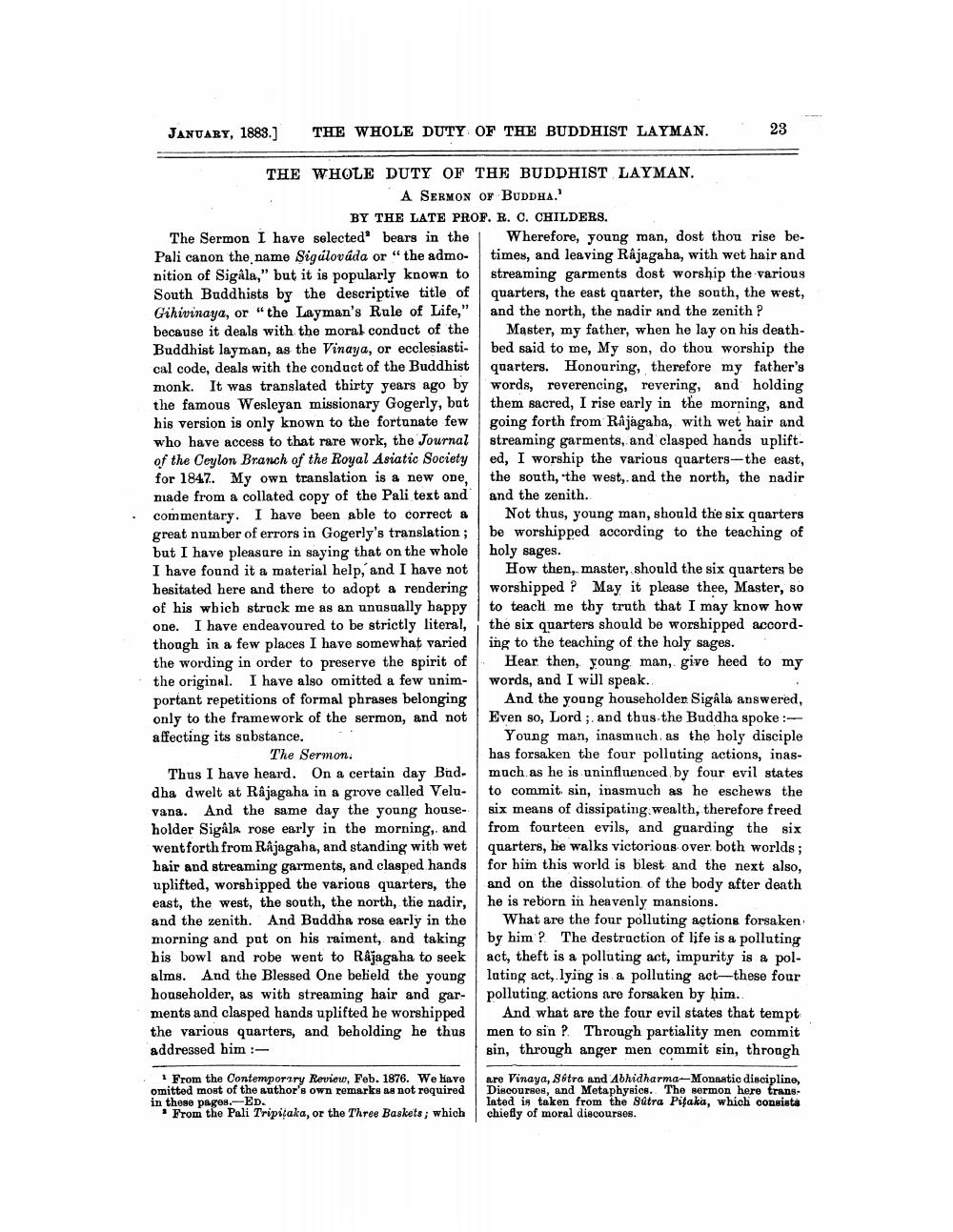________________
JANUARY, 1883.]
THE WHOLE DUTY OF THE BUDDHIST LAYMAN.
THE WHOLE DUTY OF THE BUDDHIST LAYMAN. A SERMON OF BUDDHA.'
BY THE LATE PROF. R. C. CHILDERS.
The Sermon I have selected bears in the Pali canon the name Sigálováda or "the admonition of Sigala," but it is popularly known to South Buddhists by the descriptive title of Gihivinaya, or "the Layman's Rule of Life," because it deals with the moral conduct of the Buddhist layman, as the Vinaya, or ecclesiastical code, deals with the conduct of the Buddhist monk. It was translated thirty years ago by the famous Wesleyan missionary Gogerly, but his version is only known to the fortunate few who have access to that rare work, the Journal of the Ceylon Branch of the Royal Asiatic Society for 1847. My own translation is a new one, made from a collated copy of the Pali text and commentary. I have been able to correct a great number of errors in Gogerly's translation; but I have pleasure in saying that on the whole I have found it a material help, and I have not hesitated here and there to adopt a rendering of his which struck me as an unusually happy one. I have endeavoured to be strictly literal, though in a few places I have somewhat varied the wording in order to preserve the spirit of the original. I have also omitted a few unimportant repetitions of formal phrases belonging only to the framework of the sermon, and not affecting its substance.
The Sermon.
Thus I have heard. On a certain day Bad. dha dwelt at Râjagaha in a grove called Veluvana. And the same day the young householder Sigala rose early in the morning, and went forth from Rajagaha, and standing with wet hair and streaming garments, and clasped hands uplifted, worshipped the various quarters, the east, the west, the south, the north, the nadir, and the zenith. And Buddha rose early in the morning and put on his raiment, and taking his bowl and robe went to Rajagaha to seek alms. And the Blessed One beheld the young householder, as with streaming hair and garments and clasped hands uplifted he worshipped the various quarters, and beholding he thus addressed him :
1 From the Contemporary Review, Feb. 1876. We have omitted most of the author's own remarks as not required in these pages.ED.
From the Pali Tripitaka, or the Three Baskets; which
23
Wherefore, young man, dost thou rise betimes, and leaving Râjagaha, with wet hair and streaming garments dost worship the various quarters, the east quarter, the south, the west, and the north, the nadir and the zenith ?
Master, my father, when he lay on his deathbed said to me, My son, do thou worship the quarters. Honouring, therefore my father's words, reverencing, revering, and holding them sacred, I rise early in the morning, and going forth from Rajagaha, with wet hair and streaming garments, and clasped hands uplifted, I worship the various quarters-the east, the south, the west, and the north, the nadir and the zenith.
Not thus, young man, should the six quarters be worshipped according to the teaching of holy sages.
How then, master, should the six quarters be worshipped? May it please thee, Master, so to teach me thy truth that I may know how the six quarters should be worshipped according to the teaching of the holy sages.
Hear then, young man, give heed to my words, and I will speak.
And the young householder Sigâla answered, Even so, Lord; and thus the Buddha spoke :
Young man, inasmuch as the holy disciple has forsaken the four polluting actions, inasmuch as he is uninfluenced by four evil states to commit sin, inasmuch as he eschews the six means of dissipating wealth, therefore freed from fourteen evils, and guarding the six quarters, he walks victorious over both worlds; for him this world is blest and the next also, and on the dissolution of the body after death he is reborn in heavenly mansions.
What are the four polluting actions forsaken by him? The destruction of life is a polluting act, theft is a polluting act, impurity is a pollating act, lying is a polluting act-these four polluting actions are forsaken by him..
And what are the four evil states that tempt men to sin? Through partiality men commit sin, through anger men commit sin, through
are Vinaya, Sétra and Abhidharma-Monastic discipline, Discourses, and Metaphysics. The sermon here translated is taken from the Sútra Pitaka, which consista chiefly of moral discourses.




